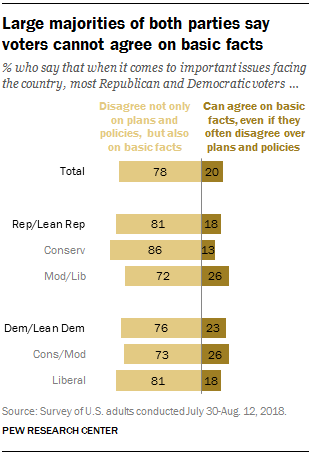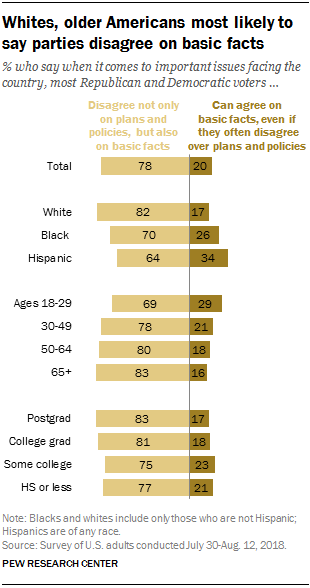Nearly eight-in-ten Americans say that when it comes to important issues facing the country, most Republican and Democratic voters not only disagree over plans and policies, but also cannot agree on basic facts.

Ironically, Republicans and Democrats do agree that partisan disagreements extend to the basic facts of issues, according to a new Pew Research Center survey, conducted July 30-Aug. 12 among 4,581 adults.
About eight-in-ten Republicans and Republican-leaning independents (81%) say Republican and Democratic voters disagree on basic facts of issues. A similar – albeit slightly smaller – share of Democrats and Democratic-leaning independents (76%) say the same. Just 18% of Republicans and 23% of Democrats say that voters of the two parties can agree on basic facts even if they disagree over policies and plans.
These views are nearly identical to the shares who said before the 2016 election that Trump and Clinton supporters could not agree over basic facts.
Ideological differences within the partisan groups are more pronounced than differences between the parties on this topic. While about seven-in-ten moderate and liberal Republicans and Republican leaners (72%) say that Republican and Democratic voters cannot agree on basic facts, an even higher share of conservative Republicans (86%) say this. Among Democrats and Democratic leaners, liberals are somewhat more likely than conservatives and moderates to think that the two parties disagree on basic facts (81% vs. 73%).

Opinion on whether or not Republican and Democratic voters can agree on basic facts differs by race and ethnicity. Whites (82%) are far more likely than blacks (70%) or Hispanics (64%) to say that voters cannot agree on basic facts. And while about a third (34%) of Hispanics and 26% of blacks say that voters of both major parties can agree on basic facts, fewer whites (17%) say the same.
These racial and ethnic differences account for the modest difference between Republicans and Democrats in these views: Among whites, nearly identical shares of Republicans (82%) and Democrats (83%) say partisans can’t even agree on the basic facts on important issues.
Younger Americans are less likely than older Americans to say that the two parties cannot agree on basic facts. About seven-in-ten (69%) of those ages 18 to 29 say Republican and Democratic voters cannot agree on basic facts. In contrast, those ages 30 to 49 (78%), 50 to 64 (80%) and 65 and older (83%) are much more likely to say the same thing. And while nearly one-third of 18- to 29-year-olds (29%) say that partisans do agree on basic facts, just 16% of those 65 and older say the same.